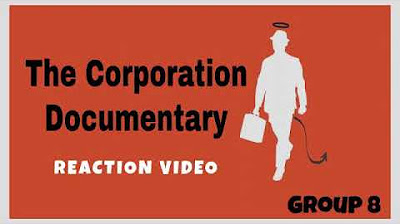THE CORPORATION - by Mark Achbar and Jennifer Abbott
Summary
TLDRThe documentary *The Corporation* critically examines the rise of modern corporations and their profound influence on society. Directed by Mark Achbar and Jennifer Abbott, the film explores the legal and ethical implications of granting corporations the same rights as individuals, highlighting their role in prioritizing profit over social responsibility. Through interviews with CEOs, whistleblowers, and scholars, the film delves into corporate behavior, externalizing costs, and the negative externalities of corporate power, such as environmental degradation and labor exploitation. While critical, it also explores socially responsible businesses and the potential for positive change driven by conscious consumer choices.
Takeaways
- 😀 The film *The Corporation* explores the complex world of corporate power and influence on society.
- 😀 It examines the historical evolution of corporations, from serving the public good to being legally recognized as 'persons' with rights and protections.
- 😀 The documentary raises ethical questions about granting corporations the same rights as individuals, especially when profit is prioritized over societal well-being.
- 😀 Interviews with CEOs, whistleblowers, and scholars provide diverse perspectives on corporate behavior and the ethical dilemmas faced within corporations.
- 😀 The film highlights the internal struggles of individuals working within corporations, torn between personal ethics and the profit-driven demands of their employers.
- 😀 It critiques the negative externalities of corporate activities, including environmental degradation, labor exploitation, and the pursuit of profit at the expense of social responsibility.
- 😀 The concept of 'externalizing costs' is introduced, where corporations shift the burden of their negative impacts onto society and the environment.
- 😀 The documentary challenges viewers to question the sustainability of the current economic system and whether it accounts for the true costs of corporate activities.
- 😀 Despite its critical stance, *The Corporation* acknowledges that not all corporations are inherently destructive and explores the rise of socially responsible businesses.
- 😀 The film suggests that responsible business practices and conscious consumer choices can drive positive change within the corporate landscape.
- 😀 Ultimately, the documentary offers a thought-provoking critique of the modern corporate world, urging viewers to consider the potential for a more socially responsible future.
Q & A
What is the central theme of the film *The Corporation*?
-The central theme of the film is the examination of corporate power and influence on society. It explores the evolution of corporations, their legal status as persons, and their impact on various societal issues such as the environment, labor exploitation, and social responsibility.
How does *The Corporation* critique the legal status of corporations?
-The film critiques the legal status of corporations by tracing their evolution from entities meant to serve the public good to their current status as legally defined persons with rights and protections. This prompts viewers to question the ethical implications of granting corporations the same rights as individuals.
What role do interviews play in *The Corporation*?
-Interviews with influential figures such as CEOs, whistleblowers, and scholars provide diverse perspectives on corporate behavior. They reveal the internal struggles individuals face within corporations, torn between personal ethics and profit-driven demands, adding a human element to the narrative.
What is the significance of externalities in *The Corporation*?
-The film highlights how corporations externalize their costs by shifting the negative impacts of their actions onto society and the environment. This concept serves as a critique of the current economic system, questioning its sustainability and whether it properly accounts for the true costs of corporate activities.
How does the documentary address environmental and social issues?
-The documentary critiques corporate practices such as environmental degradation, labor exploitation, and the pursuit of profit at the expense of social responsibility. It uses real-life examples and case studies to bring these issues into sharp focus and challenge viewers to confront the consequences of unchecked corporate power.
What is the 'externalizing costs' concept, and why is it important?
-The concept of 'externalizing costs' refers to corporations shifting the burden of their harmful activities—such as environmental damage—onto society and the environment. This is a key issue in the documentary, as it critiques the way corporations avoid taking responsibility for the full impact of their actions.
Does *The Corporation* suggest that all corporations are harmful?
-No, *The Corporation* acknowledges that not all corporations are inherently destructive. The film explores the rise of socially responsible businesses and suggests that corporations can contribute positively to society, particularly if driven by conscious consumer choices and responsible practices.
What is the film's perspective on the balance between corporate profits and societal well-being?
-The film critiques the prioritization of profit over societal well-being by corporations, raising ethical concerns about the consequences of such a focus. It questions whether corporations can or should balance the pursuit of profit with a commitment to social and environmental responsibility.
What impact does *The Corporation* suggest corporations have on individual employees?
-The documentary explores the internal struggles faced by employees within corporations, who are often torn between adhering to their personal ethics and meeting the profit-driven demands of their employers. This human element adds complexity to the film's critique of corporate behavior.
How does *The Corporation* propose positive change in the corporate world?
-The film proposes that positive change can occur through responsible corporate practices and conscious consumer choices. It suggests that businesses that operate with social responsibility in mind can contribute positively to society and inspire a shift in the corporate landscape.
Outlines

This section is available to paid users only. Please upgrade to access this part.
Upgrade NowMindmap

This section is available to paid users only. Please upgrade to access this part.
Upgrade NowKeywords

This section is available to paid users only. Please upgrade to access this part.
Upgrade NowHighlights

This section is available to paid users only. Please upgrade to access this part.
Upgrade NowTranscripts

This section is available to paid users only. Please upgrade to access this part.
Upgrade NowBrowse More Related Video

"The Corporation" - documentary film/ Reflection video

एक प्रोफ़ेसर की लायब्रेरी | A professor's library

ANÁLISE DA OBRA QUILOMBOS DO SÉCULO XXI | RÁDIO E TV JUSTIÇA 2019 | OBRA DO PAS 2 DA UnB

The Corporation Documentary- Reaction Video

Beatlemania - O Início da Histeria

EBS 다큐프라임 - Docuprime_민주주의 4부- 기업과 민주주의_#001
5.0 / 5 (0 votes)